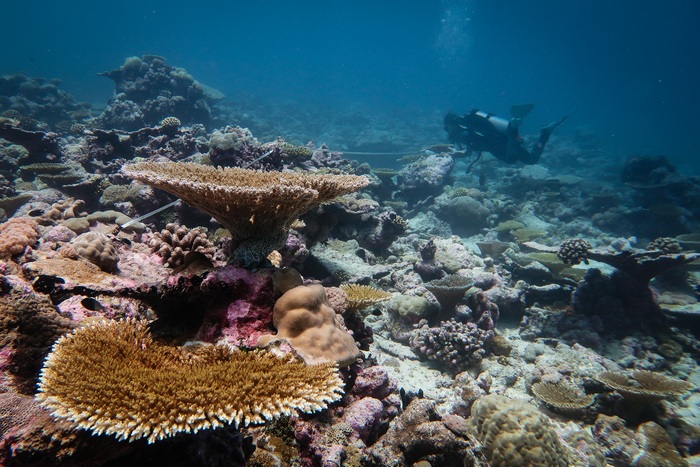Coral reefs in remote or protected areas can recover quickly after mass coral bleaching events, new research shows.

Credit: Dr Ines Lange
Coral reefs in remote or protected areas can recover quickly after mass coral bleaching events, new research shows.
University of Exeter researchers are investigating “reef carbonate budgets” – the net production or erosion of reef structure over time.
To study the impacts of climate change on reef functions, they examined 12 reefs in the remote Chagos Islands in the Indian Ocean before and after the global coral bleaching event in 2015/16.
In 2018, the formerly thriving reefs were “shrinking”, with coral cover and carbonate production down by more than 70% and erosion processes exceeding new coral growth.
When the researchers returned in 2021, all reefs were on a trajectory of recovery, although the speed varied from place to place.
Where key coral species returned quickly and the underlying physical reef structure had stayed intact, reefs showed a rapid transition back to positive growth only six years after the bleaching event.
Bleaching is caused by warmer water temperatures, which can trigger corals to expel their symbiotic algae and turn white. Corals can survive this, but an extreme heat wave causes large-scale mortality.
The speed of subsequent recovery is an important indicator of a reef’s health and resilience.
“Such high rates of coral recruitment and the rapid restoration of reef functions are a very nice surprise and imply that this location is showing some resilience, thus far, to ongoing ocean warming,” said lead author Dr Ines Lange, a postdoctoral research fellow in a multi-institutional project funded by the Bertarelli Program in Marine Science.
“A full recovery of reefs across the Chagos Archipelago over the next few years is likely if the region is spared from reoccurring marine heating events.”
Dr Lange added: “The study shows that in remote and protected areas without local impacts such as fishing or pollution from land, coral reefs and the important functions they provide are able to recover relatively quickly, even after large-scale disturbances.
“Proximity to healthy coral populations and the maintenance of a complex reef structure seems to boost recovery speed, which may help to manage reefs under the threat of increasing frequency of bleaching events predicted for the near future.”
Co-author Professor Chris Perry, from the University of Exeter, developed the census-based ReefBudget method to quantify reef carbonate budgets.
These carbonate budgets are important indicators of a reef’s ability to provide habitat to marine life, protect shorelines from wave energy and help reef islands to keep up with future sea level rise.
Over the last years, Prof Perry and Dr Lange optimised the method for the central Indian Ocean by quantifying and integrating local rates of coral growth and parrotfish erosion.
The paper, “Recovery trends of reef carbonate budgets at remote coral atolls six years post-bleaching” is published in Limnology and Oceanography by Ines Lange, Chris Perry and Marleen Stuhr.
Journal
Limnology and Oceanography
Method of Research
Observational study
Subject of Research
Not applicable
Article Title
Recovery trends of reef carbonate budgets at remote coral atolls six years post-bleaching
Article Publication Date
24-Mar-2022




